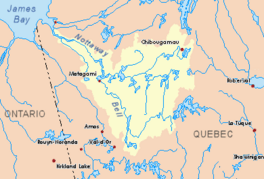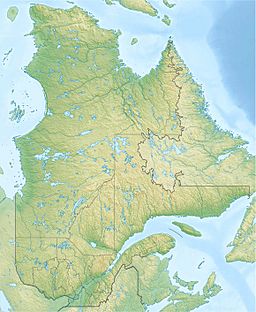Lake Poncheville facts for kids
Quick facts for kids Lake Poncheville |
|
|---|---|

Watershed of Nottaway River
|
|
| Location | Eeyou Istchee James Bay Regional Government, Quebec |
| Coordinates | 50°09′20″N 76°57′33″W / 50.15556°N 76.95917°W |
| Type | Natural |
| Basin countries | Canada |
| Max. length | 37.1 kilometres (23.1 mi) |
| Max. width | 7.7 kilometres (4.8 mi) |
| Surface elevation | 269 metres (883 ft) |
Lake Poncheville is a beautiful freshwater lake located in the Eeyou Istchee James Bay region of Quebec, Canada. It's a natural lake, meaning it wasn't made by people. The southern part of the lake touches the areas called Des Combes and Grandfontaine.
People in this area mostly work in forestry, which means they manage forests and cut trees. After forestry, tourism is important. This is because you can travel by boat for about 60.9 kilometres (37.8 mi) across Lake Poncheville and connect to other lakes like Opataouaga Lake and "Lac de la Hauteur des Terres". To the north, Quénonisca Lake is another large lake, about 52.1 kilometres (32.4 mi) long, that connects to the Broadback River.
You can reach the area around Lake Poncheville by using a forest road that runs from east to west. This road connects to another road further north.
The surface of Lake Poncheville usually freezes over from early November until mid-May. However, it's generally safe to travel on the ice from mid-November to mid-April.
Exploring Lake Poncheville's Geography
Lake Poncheville is shaped a bit like an upside-down hook. It is about 37.1 kilometres (23.1 mi) long and its widest part is about 7.7 kilometres (4.8 mi). The lake sits at an elevation of 269 metres (883 ft) above sea level.
The lake has two large bays on its eastern side. The southern bay stretches for about 14.4 kilometres (8.9 mi), and the northern one goes for about 13.4 kilometres (8.3 mi). The Poncheville River flows through the lake from south-west to north-east. This river is a branch of Maicasagi Lake.
Water flows into Lake Poncheville from different places. On the west side, it gets water from Ouescapis Lake. On the east side, water comes from the "Lac de la Hauteur des Terres" (which means "Lake of the Height of the Lands"). This water flows into a bay that stretches to the north-east for about 5.3 kilometres (3.3 mi).
The water leaves Lake Poncheville from its northern end. It flows into Opataouaga Lake through a narrow passage called the Sable Strait, which is about 7.5 kilometres (4.7 mi) long. This exit point is located:
- About 10.9 kilometres (6.8 mi) south of where Opataouaga Lake flows out.
- About 56 kilometres (35 mi) south of where Quénonisca Lake meets the Broadback River.
- About 90.0 kilometres (55.9 mi) southeast of where Evans Lake flows out.
- About 202 kilometres (126 mi) east of where the Broadback River meets Rupert Bay.
- About 119 kilometres (74 mi) north-east of the town of Matagami.
- About 53.4 kilometres (33.2 mi) north-west of the village of Waswanipi.
Many rivers and lakes are connected to the area around Lake Poncheville. Some of the main ones include:
- To the North: Opataouaga Lake, Quénonisca Lake, and Salamandre Lake (Broadback River).
- To the East: Chensagi River West, Chensagi River East, Chensagi River, and Maicasagi River.
- To the South: Canet River, Waswanipi River, Goéland Lake (Waswanipi River), Olga Lake (Waswanipi River), and Lake Matagami.
- To the West: Ouescapis Lake, Muskiki River, Soscumica Lake, and Nottaway River.
The Story Behind the Name: Poncheville
This lake has had a few different names over the years! On a map from 1898, it was called "Opitawakan L.". This name comes from the Algonquin or Cree languages and means "lake of high place". This makes sense because Lake Poncheville is about 12 metres (39 ft) higher than Quénonisca Lake, which is downstream.
Later, in 1911, a map showed the lake as "Lady Beatrix Lake". This name was given after one of the daughters of the Marquis de Lansdowne, who was the Governor General of Canada from 1883 to 1888. This name was used in documents until 1963.
Then, a new name was officially chosen: "Lac Poncheville". This name honors Canon Charles Thellier of Poncheville (1875-1956). He came from an old noble family and was born in a town called Valenciennes. He became a priest in 1900.
Charles Thellier of Poncheville was a pioneer in social Catholicism, which means he worked to apply Catholic teachings to social problems. He first visited Montreal in 1910 for a special church event. He was also a chaplain (a priest serving in the military) during World War I (1914-1918) and was present at the famous Battle of Verdun in 1916.
He returned to Canada several times, including in 1917, to give sermons at the Notre-Dame Basilica in Montreal. He was a strong supporter of Canada in France. Poncheville wrote many sermons and religious books, as well as articles about French Canada. The name "Lac Poncheville" became official on December 5, 1968, when the Commission de toponymie du Québec (Quebec's Place Names Commission) was created.
 | Anna J. Cooper |
 | Mary McLeod Bethune |
 | Lillie Mae Bradford |


